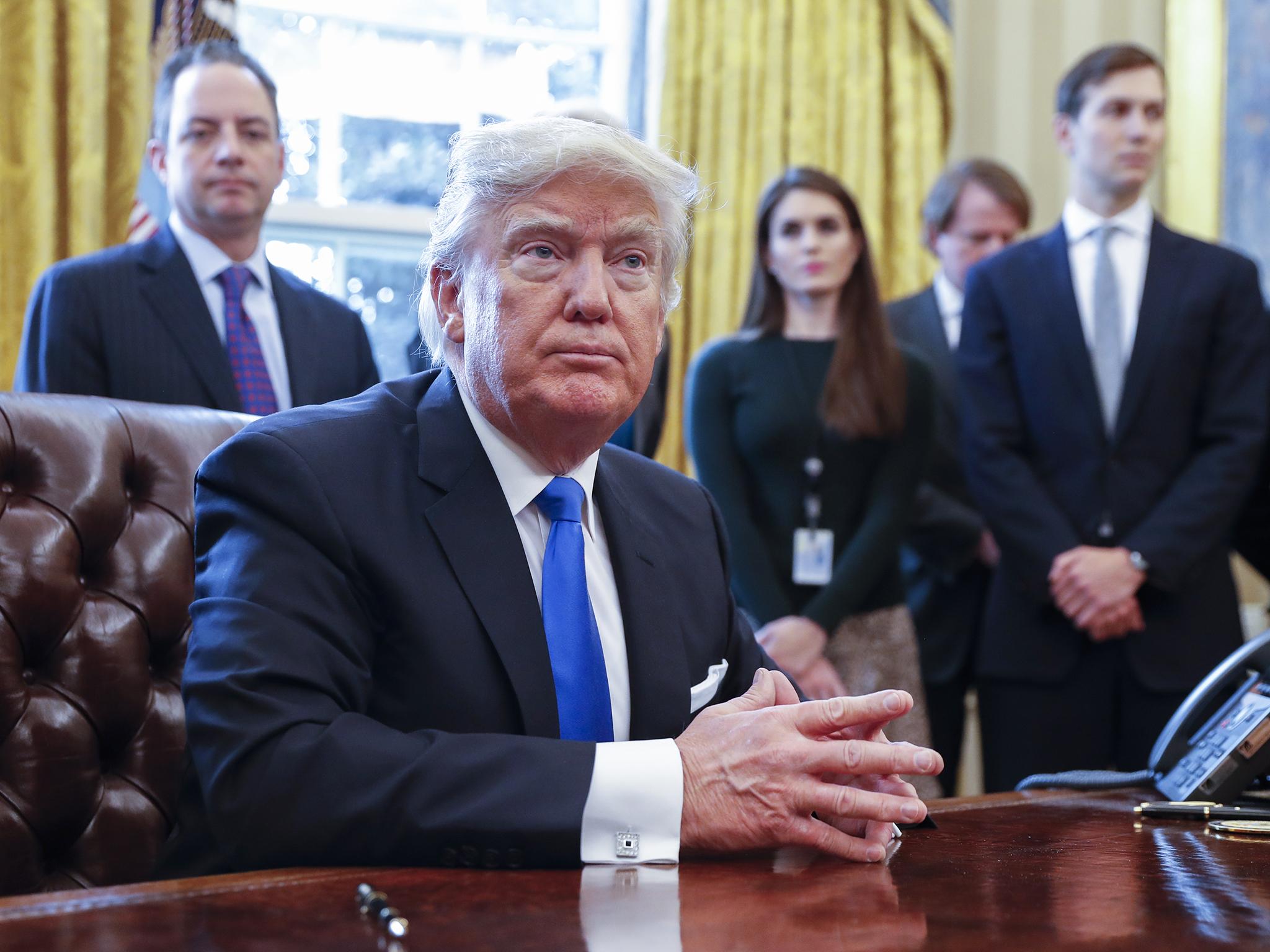Donald Trump facing backlash and possible legal challenges over Muslim immigration ban
President expected to sign executive order on Wednesday blocking visas for people from seven Muslim-majority countries

Donald Trump is facing a pre-emptive backlash over his reported plans for a ban on people from seven Muslim-majority countries entering the US.
The President is widely reported to be planning a series of executive orders and policy announcements on Wednesday, which he has billed as a “big day planned on national security”.
Reuters reported that the orders could include a temporary ban on most refugees and a block on any visas at all being issued for people from Syria, Iraq, Iran, Libya, Somalia, Sudan and Yemen. It cited congressional aides and immigration experts who had been briefed on the matter, who asked not to be identified.
The UN led criticism of the reported plans, saying even a temporary delay on existing refugee relocation programmes would be “highly concerning” for those involved. And legal experts suggested the ban on people from Muslim-majority countries could be challenged as unconstitutional if it was proved to discriminate on religious grounds.
“Any substantial delay in the relocation of refugees...would be highly concerning from a humanitarian perspective,” said Catherine Stubberfield, a spokeswoman for the UN High Commissioner for Refugees.
“These men, women and children can no longer afford to wait.”
Hiroshi Motomura, an immigration expert at the UCLA School of Law, said detractors could launch legal challenges if the visa ban does indeed target only Muslim-majority countries.
Legal arguments could claim the executive orders discriminate against a particular religion, which would be unconstitutional, he said.
“His comments during the campaign and a number of people on his team focused very much on religion as the target,” Mr Motomura said.
Tweeting in reaction to early media reports last night, the director of the Council on American-Islamic Relations (CAIR) Nihad Awad said: “These [executive orders] will not make our nation safer, rather they will make it more fearful and less welcoming.”
And Stephen Legomsky, who was chief counsel at US Citizenship and Immigration Services in the Obama administration, said the President had the authority to limit refugee admissions and the issuance of visas to specific countries if the administration determined it was in the public interest.
“From a legal standpoint, it would be exactly within his legal rights,” said Mr Legomsky, a professor at Washington University School of Law in St Louis. “But from a policy standpoint, it would be terrible idea because there is such an urgent humanitarian need right now for refugees.”
While it remains to be seen precisely what Mr Trump will announce on Wednesday, some plans for his sixth day in office are more certain.
He is expected to take part in a ceremony installing the retired Marine General John Kelly as his new secretary of homeland security.
And according to one of Mr Trump’s late night tweets on Tuesday, he will make good on his promise to order the building of a border wall between the US and Mexico.
White House spokesman Sean Spicer said on Tuesday that the State and Homeland Security Departments would work on what Mr Trump has billed as an “extreme vetting” process once Trump nominee Rex Tillerson has been installed as Secretary of State.
Sources told Reuters the Mexico wall and immigration orders were likely to be the first signed on Wednesday, while the refugee ban will come afterwards, possibly later in the week.
The latter threatens a refugee resettlement deal with Australia signed late last year, and could leave more than 1,000 asylum seekers in limbo.
The US agreed to resettle an unspecified number of refugees being held in Papua New Guinea (PNG) and the tiny South Pacific island nation of Nauru on Australia’s behalf, under a deal to be administered by the U.N. refugee agency.
That came after Australia agreed to help resettle refugees from Guatemala, Honduras and El Salvador under a US-led programme.
Australia's tough border security laws mandate that asylum seekers intercepted trying to reach the country by boat go for processing to detention camps on PNG's Manus island and Nauru.
"We already didn't have much hope the US would accept us," said Behrouz Boochani, an Iranian refugee who has spent more than three years on Manus island.
"If they do not take us, Australia will have to."
Additional reporting by Reuters
Subscribe to Independent Premium to bookmark this article
Want to bookmark your favourite articles and stories to read or reference later? Start your Independent Premium subscription today.

Join our commenting forum
Join thought-provoking conversations, follow other Independent readers and see their replies